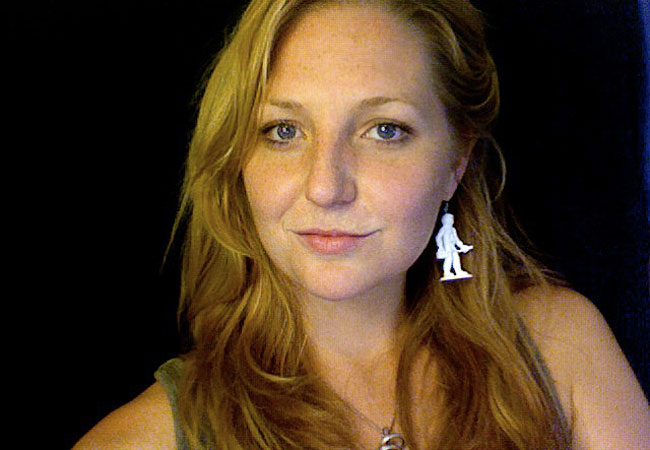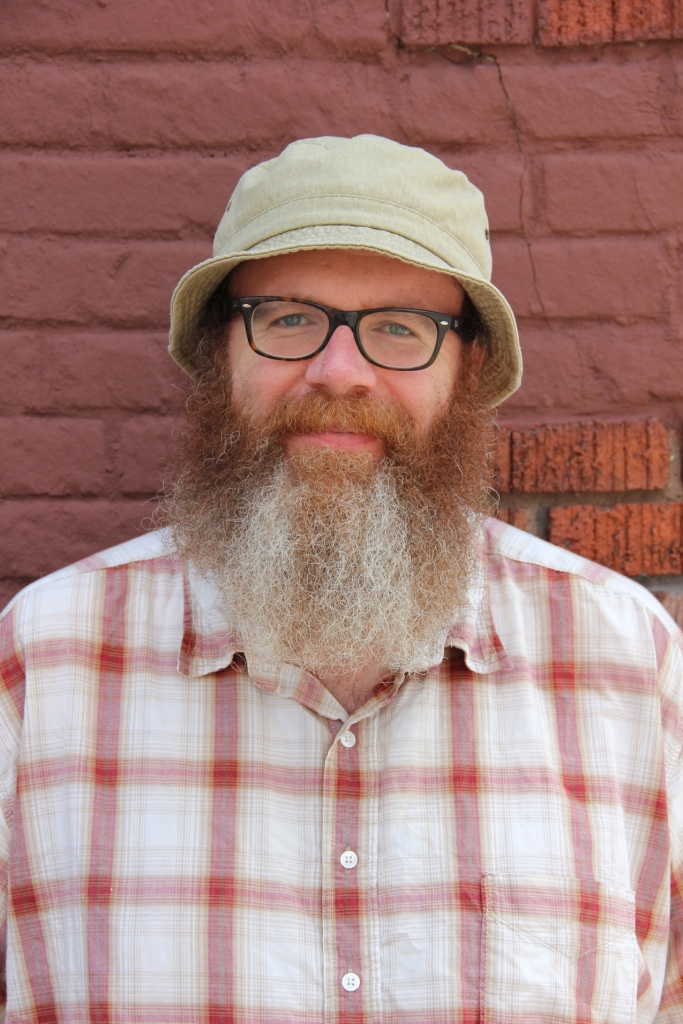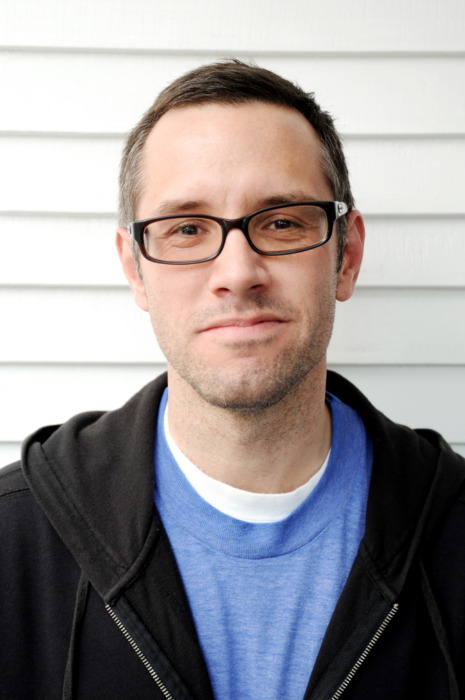The Chat: Minnesota Humorists Talk Shop
Writer and performer Maggie Ryan Sandford gathers together our favorite writerly wit-erati -- Brian Beatty, Dennis Cass, John Jodzio -- for a free-ranging, entertaining and insightful online chat about what it takes to bring the funny to the page.





MAGGIE RYAN SANDFORD: So thanks for meeting me here in the internet, guys. I thought it would be “fun” if we all introduced one another, so our readers can figure out why the hell to read a transcript of us chatting with each other. I’ll start: Brian Beatty‘s work makes me laugh the way a person laughs when she’s looking down the barrel of a gun. There’s fear there, and deep, deep sadness, but also the smallest sliver of enlightenment that comes with facing one’s own mortality — even in his shortest works, which are only a few lines long.
BRIAN BEATTY: John Jodzio‘s stories are wonderful examples of comedic absurdity. Like Saunders and Barthelme and Allen before him, John creates inhospitable worlds that can only be laughed at, or views the everyday world through a cracked or crooked lens. Yet John’s characters soldier on — quite often deliriously, to the reader’s delight. That determinism in the face of common sense never gets old. I would cite specific examples from John’s book, but I’m writing this in Scotland and the bars just opened. Because I traveled without John’s book, I’m feeling the need to drink more than usual.
JOHN JODZIO: I once saw Dennis Cass make a man who’d been stuck inside a dumbwaiter for six hours laugh his ass off. It was a dire situation, but that’s Dennis’ comedic charm — he has the innate ability to make everyone who reads his work or sees him perform more comfortable in their own skin. I’ve loved Dennis’ writing for a long damn time — and I love it even more since he helped get me out of that dumbwaiter.
DENNIS CASS: What I like about Maggie Sanfor’s work is that it’s impossibly strange, while also feeling completely natural. A man who buries himself alive, a divorced couple who literally split custody of their dog — this is the kind of weird, funny stuff I’ve come to expect from Maggie. I can’t wait to see what she does next.
SANDFORD: Thanks, Dennis — especially for making sure to spell my name correctly. People so often mess that up. Now let’s get serious: When did you guys discover The Funny?
BEATTY: I didn’t start out to write (or perform) humor. I was the most miserable, pretentious literary wannabe for so long — halfway into my MFA years, in fact. But the more I published work as an earnest snob artiste, the more I felt a sick rumbling in my gut. Deep down, I knew I didn’t have the intellectual heft to become the hillbilly David Foster Wallace or Donald Barthelme or Thomas Pynchon, as I’d always envisioned. [That] rattled me.
SANDFORD: But Brian Beatty does have a full hillbilly-status beard, for you readers at home.
BEATTY: Once out of school, I rediscovered Kurt Vonnegut and Terry Southern, and came to appreciate Barthelme’s incredible humor (in addition to his structural daring) for the first time. Pretty soon, my short fiction became more like New Yorker “Shouts & Murmurs” features, and my poetry more like shaggy dog stories and one-liners broken across stanzas. The humor that started as consolation and compensation ultimately became my working method, influencing everything that I write.
CASS: What I like about Brian’s story is that his writing changed when he changed. Pretentious Brian could have used comedy as a technique, but The Brian We Like and Actually Want to Be Around has a comic sensibility. When we think of comedy we tend to focus on the jokes and the laughs, but I like what Brian said about humor being a “working method.” To really do this thing, I think you either need to naturally see the world as funny, or gradually develop a mind that sees and thinks in jokes or proto-jokes.
JODZIO: My experience was kinda the same as Brian’s. When I got to college, I decided I wanted to be a writer and immediately became really effing precious. I suddenly morphed into someone who thought T.S. Eliot lines like “I will show you fear in a handful of dust” were rad. The stories that I wrote then were mostly breakup scenes in coffee shops, thick with clove cigarette smoke; conversations between my characters were mostly about how sweet Rimbaud is. Upon leaving the coffee shop there was usually some sort of bad traffic accident — it was usually a car accident, but if I was feeling especially pretentious, I would make it a Vespa or trolley accident. At some point in college, I started reading Gordon Lish’s The Quarterly and discovered writers who could do both funny and sad, like Amy Hempel, Mark Leyner, Sam Lipsyte and David Sedaris. I slowly realized that you need to have some humor, as a buoy, in any story where you have a Vespa running into a trolley and someone being decapitated. I think I was always thinking about the world, as Dennis says, in jokes or proto-jokes, but for whatever reason I didn’t think this was a way I could actually write a story.
SANDFORD: I grew up reading a lot of funny literature, possibly because my parents are both actors, and laughter is important onstage — even in a tragedy, or the audience goes home unsatisfied and depressed. I’m talking Mark Twain, Maya Angelou, John Steinbeck, Nikos Kazantzakis, poets like Shel Silverstein, Ishmael Reed, dramatists like Shakespeare, Moliere, Dario Fo. Then I went to college, realized I was good at improv and sketch, and decided that humor was the way for me to most effectively communicate with the world. And so I moved to New York to perform sketch and write for TV. That was great, but after a couple years, I realized I actually missed the literary world, so I moved away from New York to focus on lit. I think my favorite balance lies in between — right in the George Saunders area. He changed the way I think about writing.
CASS: When I was a kid I loved Dr. Seuss and Maurice Sendak, both of whom are not only funny, but also witty. Then I liked Roald Dahl, who was funny, but also dark. Then it was Tom Wolfe and Hunter S. Thompson and Dickens who were funny, but also informative. Finally, it was Martin Amis and George Saunders because they’re funny and also somehow unobtainable in their excellence. My current favorite is Simon Rich, who writes for Saturday Night Live and The New Yorker. His work is impossibly economical. Google “Dalmations” and you’ll see what I mean.
SANDFORD: Also, Miranda July, Flannery O’Connor, and, to a certain extent, Aimee Bender. Is Aimee Bender straying too far from what we’re talking about, here?
BEATTY: I consider Bender funny. Saunders, too.
SANDFORD: Jodzio’s been compared to Saunders a grippa times. Bitch.
CASS: I think it’s up to you how you want to define “humor writing.” I assumed you meant words on paper without pictures or photographs. Once we start talking about other forms, we get into more of a performance tradition, or in Ms. Bender’s case a visual tradition, which is a different set of skills and tools. I’d vote for keeping this about words on paper, to keep us focused.
SANDFORD: Yeah, I think that’s important. For our purposes, we’ll stick to defining “humor writing” as: words on paper that must be read to be understood. But, is it not the case for all four of us that we enjoy reading in front of people (aka performing), and does that not fuel our desire to write funny material? That is: Laughs=instant gratification.
JODZIO: I don’t think I really came around to writing any straight humor pieces until McSweeney’s Internet Tendency started up. I had a bunch of these strange scenarios and voices that wouldn’t hold up under normal “literary” story circumstances, but which could hold up fine for a 500-word jokey thing.
SANDFORD: McSweeney’s Internet Tendency kind of changed the game for a lot of people, I think. And some of the funniest short fiction I’ve ever read was in Issue 5 of the quarterly magazine, even before the website. Then, when their first “Humor” collection came out, I remember being so stoked that a capital-“L” Literary Journal was giving humor its weight. Yet, at the same time, I remember thinking that labeling it as “Humor” seemed almost cheap — I was 17 when it came out, so I thought everything was cheap.
BEATTY: Labeling something that’s humorous with the tag “humor” does sometimes cheapen it. That label calls to mind, for me anyway, those little gift books of cat cartoons grandmothers buy at grocery stores and candle shops.
SANDFORD: On one hand, if you write a piece and call it HHHumor, someone might pick it up because they’re in the mood to laugh. On the other hand, once you label something as “humor,” the reader automatically thinks, “Okay, funny guy, make me laugh,” and maybe the audience allows less room for subtlety.
JODZIO: I think the short humor pieces I write are always for some sort of instant gratification, because they are can be quickly published/read on the internet or because I would rather read something that people laugh at when I read live, so I know what’s going on in their heads. While I am thinking about other things like plot and character when I write a story, the major thing I am always thinking is “Would this be boring to anyone that read this?”
BEATTY: In regards to writing for an audience at a reading, I came at that totally backwards. I started doing stand-up before I started reading funny pieces in front of literary crowds. But that laugh in the moment is exponentially more thrilling to me than seeing something “in print” and having no clue if anybody ever read what I wrote.
SANDFORD: It’s like a drug.
BEATTY: Unlike Jodzio, I also have no problem boring people with something I’ve written if I think it’s funny. Maybe I’m still a bit pretentious that way.
SANDFORD: I’m also terrified of boring people. Making people bored, that is, not…people who are boring…who are by definition not scary. To bore people is worse, almost, than actively turning people off; if someone actively dislikes what I’ve written, at least they’ve had some kind of visceral reaction.
________________________________________________________
“You have to put the reader into that delicately balanced place between comfort and discomfort–comfortable enough to feel like they get the joke but with enough discomfort to build the tension that leads to laughter, the “comic relief.” Humor writing is like facilitating a thousand little orgasms.”
________________________________________________________
BEATTY: I’m curious, who are you guys trying to entertain when you’re putting stuff on the page: yourself or your audience? Or, is it somebody else entirely?
JODZIO: I’d guess it is probably 80% audience, 20% me. That said, the stuff I write is always 100% about revenge.
CASS: If I think [a bit is] funny, then it seems reasonable to think someone else will find it funny. But once it’s on the page, then it doesn’t quite belong to me; my job is to make sure the audience has everything they need to get the joke. I’m sure you’ve run into the bad storyteller who gets to the failed punch line and then realizes he has to backtrack: “Oh, I forgot to tell you that Peter and Amanda got married the week before the accident. That’s why the part with the chairlift is funny.”
SANDFORD: Right. You have to put the reader into that delicately balanced place between comfort and discomfort: They must be comfortable enough to feel like they get the joke and therefore can laugh, while at the same time, discomfort has to be present to build the comic tension which leads to the laughter – a.k.a. the “comic relief.” Humor writing is like facilitating a thousand little orgasms. I think we can print that.
BEATTY: My lifetime orgasm tally just skyrocketed exponentially. I had no idea that was what I was supposed to be doing. Thanks, Maggie. I relish the build-up of comedic tension — almost to the point that I don’t care how artfully I release it. The young Pretentious Me would be so ashamed.
JODZIO: I guess, I generally think about things this way (comfortable orgasms vs. uncomfortable orgasms); but, largely, I never think about any sort of comedic theory while I am writing these things (mostly because I don’t know any). Do you? Really?
SANDFORD: No, I don’t, not while I’m writing. In the editing process, though, yes — if something doesn’t work, I’ll go back and feel it out with these theories in mind: Does that not hit hard enough because the audience is too confused…? Is this only funny to me, or is there something universal, there? Is the timing right? How do you guys deal with timing on paper? (For me, it’s mostly about reading aloud/in my head.)
BEATTY: Sometimes I’m super-theoretical about it. Sometimes I just riff until I find a laugh.
JODZIO: I edit things about 500 billion times, until the voice in my head stops telling me what I’ve written is dumb and switches back to telling me to cut myself.
BEATTY: If you want to be cut, Jodzio, all you have to do is ask. That’s my idea of revenge.
JODZIO: I actually only weigh 130 lbs but all these phone books that I have taped to my body to survive a Beatty shiving make me look way more bulky.
SANDFORD: How about you, Cass: Is your inner voice a cutter? An alcoholic? An overeater?
CASS: My self-hatred is all at the macro level and boils down to wishing I were more motivated and/or productive. I’m actually happiest when I’m on the page. My inner voice is demanding but calm. I know I’ll get there if I keep revising, reading, thinking, playing, etc. It’s getting my ass in the seat that’s the challenge.
SANDFORD: Oh, I hearrrd that, sister.
BEATTY: I mull over paragraph breaks, sentence structure and em-dashes to communicate timing — exciting revelation, I know. If I can’t be there to perform a piece for each reader, I want to recreate how I would perform it, as best I can. That totally changed how my stories and poems look on the page, too. There’s a lot more white space than there used to be, to replicate my stammering, pause-y drawl. Do you guys measure differently something that’s situationally funny vs. something that’s conceptually funny vs. something that uses wordplay to achieve its funny effects? Flannery O’Connor is pretty much squarely in the first category, George Saunders straddles the first two categories, Ian Frazier writes mostly in the middle category, and into the last category I’d slot humorous children’s book authors such as Daniel Pinkwater and Norton Juster. Also deadpan vs. slapstick?
CASS: I tend to gravitate to the drier side, but I’m up for anything as long as it feels earned.
SANDFORD: Same here, I think, but can I ask you to define slapstick in writerly terms? It seems to me that the literary equivalent of slapstick is blustery, intense, possibly obscene language, but a slapsticky situation can be written very dryly. (Again, I’d cite Miranda July.)
BEATTY: I would consider some of David Sedaris’ earlier essays to be on the verge of slapstick. His original “Santaland Diaries” and “You Can’t Kill the Rooster,” about his brother, come to mind. Terry Southern’s Candy, too. And I’d call Chuck Palahniuk’s novels examples of black humor slapstick.
JODZIO: I see a lot of writers who use humor employing a bunch of different styles. I mean, while Saunders is always situationally and conceptually funny, I would say that “Adams” by George Saunders is probably the most slapstick story I’ve ever read. The word “wonk” is used as a verb, like, 25 times.
SANDFORD: This kind goes back to the idea that good humorists are still interested in the idea behind the gag — the idea which the gag highlights — and “Adams” is a perfect example of that. It’s not actually about the prat falls, it’s about the terrible things a man will do when he feels emasculated.
CASS: I’m wondering: Do any of you feel like there is a humor glut? So much funny in so many forms so… all the time — not to mention how worked-over anything topical gets. How do you stay fresh? Is freshness even possible?
JODZIO: I don’t think there’s really that much of a glut of genuinely funny stuff. I know that it takes a lot to make me laugh, and it always has. There’s maybe more crap that I have to sort through to get to the good stuff, though.
BEATTY: More online avenues for literary humor seem to emerge on a daily basis, too, even if it’s just the deluge of funny-ish Facebook status updates on the outrageous news item of the moment. Freshness, I think, is a matter of having a unique point-of-view — and those never seem to be in oversupply. The topical doesn’t interest me too much. I’m so enamored with my own bellybutton, I only realize I’m out of step with the yuks du jour when I look up to see what everybody else has been doing in my absence.
JODZIO: I’m totally not interested in writing anything topical either. I’m pretty much only interested in writing comedic pieces that are character- or situationally driven. Maybe that is solely because by the time I’d actually get around to writing something topical, it has usually gone stale.
SANDFORD: I think that not writing topical material just means you guys (us guys) are more interested in timeless, universal “truths.” That sounds wicked snobby.
JODZIO: A different spin on these universal themes is what I think we’re all looking for in comedy. I think Dennis mentioned Simon Rich before. A lot of his pieces deal with situations that have been done many times before (i.e. childhood fear of monsters in the closet, invisibility, vampires, etc.) but he gives them a little tweak or looks at them from a fresh perspective to make them totally new.
SANDFORD: Yeah — as long as there are things to write about, there will be things to write humor about. And that seems like a logical place to end The Chat, don’t you think?
________________________________________________________
About the participants:
Our moderator, Maggie Ryan Sandford, is a writer who splits her time between St. Paul, Portland, Seattle and New York. She writes in various genres for such institutions as ComedyCentral.com, the Onion A.V. Club, and mental_floss magazine, and her creative writing has garnered attention from the Seattle’s Richard Hugo House, National Public Radio, NYtimes.com, and mnartists.org‘s mnLIT series. As a performer, her work has been seen and heard at the Guthrie Theater, the Upright Citizens Brigade Theatre, and the People’s Improv Theater.
________________________________________________________
Brian Beatty has published his jokes, poems and short stories in a variety of print and online publications. He’s performed comedy all over the Twin Cities. Brian’s humor chapbook DUCK! was published in 2009. He will serve as the host for mnartists.org’s new literary podcast, YOU ARE HEAR, beginning in January 2012.
________________________________________________________
Dennis Cass is a writer and a teacher and a guy who sometimes gets on a stage where there is a microphone and says things into the microphone. His work has appeared in Harper’s Magazine, the New York Times Magazine, GQ, Mother Jones, and the online journal Slate. His first book, HEAD CASE: How I Almost Lost My Mind Trying to Understand My Brain (HarperCollins), is out in paperback. He has taught creative nonfiction at Carleton College and judged the Literary Death Match.
________________________________________________________
John Jodzio is a winner of the Loft-McKnight Fellowship. His stories have appeared in One Story, Opium, The Florida Review and a number of other places, both print and online. He’s won a Minnesota Magazine fiction prize and both the Opium 500 Word Memoir competition and Opium Fiction Prize. He’s published two short story collections If You Lived Here, You’d Already Be Home (Replacement Press) and Get In If You Want To Live (Paper Darts Press).